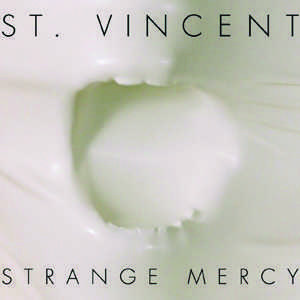On the track “Surgeon” from St. Vincent’s third album “Strange Mercy,” Annie Clark says, “Best, finest surgeon, come cut me open.” Clark’s lyrics come from a quote said by Marilyn Monroe to Lee Strasberg on the idea of digging into the character and vulnerability of a person. The idea of a fractured, nervous beauty standard pervades the (ironically) beautiful “Strange Mercy.”
Following up on the brilliance of 2009’s “Actor,” Annie Clark’s multi-instrumentalist ways produce a record-breaking notion of the boundaries of guitar. Her metaphor is the idea of tearing apart what you know and reconstructing it.
Clark draws from references to Monroe, the films of Erich Rohmer and 1950s domesticity to tear all of those things down. But, I’ll avoid going into territory that thousands of media outlets have already gone into with this record. More interesting to me than the record itself, which is very worthy of being listened to, is that Clark’s words represent the old style of a record, a true standout album filled with great songs, with nothing overtly movement-worthy.
I don’t think I’ve ever addressed the concept of a “movement,” so I’ll do so right now. You know how the media portrays the 1960s as Woodstock, the 1980s as new wave, and the early 1990s by the “Smells Like Teen Spirit” video? Well, the underground’s movements are similar, from punk to post-punk to garage punk that sounds like pre-punk music.
But the best record of this year, and one that hopefully will stand the test of time, seems more inclined on attacking general standards of popular culture. This record is way better than anything Odd Future will put out this year, but those guys somehow represent a movement. St. Vincent represents an admittedly pretty woman obsessing over the concept of what is ugly or if being pretty really represents anything positive after all. It’s a pretty deep philosophical subject for a record with a Steely Dan-like prog solo, like on “Neutered Fruit.”
Maybe I’m asking the wrong questions. The great thing about music is that our rubrics of judgment can be wildly different. Most fans go for music with a familiar sound; others go for something they feel represents them (even if it is an idealized version), and still others find pleasure in things other people like. I don’t know if St. Vincent sounds like any of these things to you, and I severely doubt that unless you already like things with an indie aesthetic that you will enjoy her.
Then again, that could always be the point. When most think of Marilyn Monroe, they think of pretty dresses and blonde hair. Clark thinks instead of the strange sentiments she voices. Clark claims “Cheerleader” was almost called “Dirteater,” but the former had a better ring to it. She also said she isn’t criticizing the practice of cheerleading.
“Strange Mercy” is a record of contradictions, which naturally means all of these contradictions flow into my thoughts. And like those thoughts, there are no clear answers in this record, and understandably, it’s that lack of clarity that is secretly brilliant. Clark creates questions out of thin air that not only have no answers, but may not even be the right questions to ask.
It’s just up to us to find the joy within.









